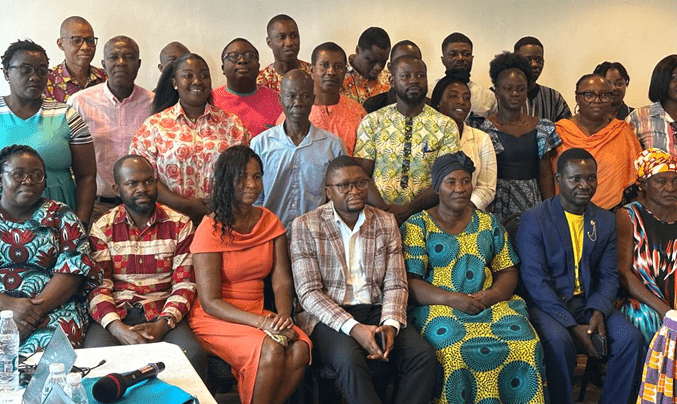By Ernest Bako WUBONTO
A new research report titled ‘Corporate Human Right Abuses in Mining Communities in Ghana’ by Livelihood and Environment Ghana (LEG) has revealed that violence, intimidation and forced evictions are still perpetuated against local indigenes by both large-scale and small-scale mining companies.
The report was conducted in seven of the most endowed gold mining regions of the country -Ahafo, Western, Ashanti, Eastern, Central, Western North, and Upper East Regions – and highlighted that the exploitation of mineral resources leads to colossal environmental degradation such as of arable land, farms, forests; heavy pollution of water-bodies; and above all, issues of human rights abuse.
Some victims shared their experiences of being laid-off after sustaining serious injuries though promised alternative roles; failure by the companies to pay up compensation and medical bills after initial treatment fees; and eviction from farms and homes without rightful compensation, among others.
Research Lead cum Lecturer KNUST Environmental Sciences Department, Frank Baffour Ata, PhD, stressed that having realised that the benefits of mining have not been equitably distributed, leading to widespread poverty and social issues in mining communities. The research seeks to find evidence on issues about corporate human rights abuse in these areas’ natural minerals exploitation.
“The investigation into corporate human rights abuse in mining communities of Ghana reveals significant social and human rights impacts on local populations by both large-scale and artisanal/small-scale mining activities.
“We wanted to find out the human rights abuses happening in these mining communities, and some of the abuses recorded include violence and intimidation, forced displacement, loss of livelihoods, health issues, environmental degradation and gender disparities,” he said.
He also highlighted that, unfortunately, there is also a wide awareness-gap in terms of mitigative regulations, laws and policies that provide some form of protection to these communities; hence the need for more sensitisation and education of indigenes in these areas, by both civil society organisations and related state agencies.
“A significant portion of the population is unaware of existing regulations and even fewer have witnessed their enforcement. This gap in regulatory enforcement exacerbates the negative impacts of mining and undermines community trust in both government and mining companies.
“Despite these challenges, some communities have demonstrated resilience and implemented various strategies to cope with the negative impacts of mining. These strategies include community mobilisation, alternative livelihood programmes, environmental conservation projects, health initiatives and advocacy efforts,” he indicated.
However, the majority of communities still lack the resources and support needed to effectively mitigate these impacts.
The report recommended that policymakers must do more to ensure strong regulatory enforcement, provide community engagement and support services, introduce economic development programmes to these communities and implement pragmatic environmental protection initiatives.
The communities also demanded that mining organisations be made to comply with regulations, compelled to invest in community development and ensure fair labour practices, as well as reducing environmental impact among others.
Executive Director-LEG Richard Adjei-Poku, touching on the recommendations, stressed that with civil society organisations identified as critical role-players in advocating for community rights, providing legal support, building community capacity and monitoring abuses, policymakers must support these organisations by providing funding, resources and a conducive environment for their operations.










